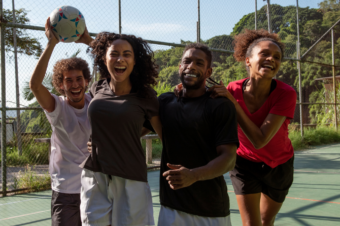

GET MENTAL: Mastering Motivation
LEVELUP INSIDERS November 4, 2015 Erika Westhoff 0

There are different types of motivation; finding the right blend makes a difference.
What drives your motivation? Are you super competitive and always find a way to be the best on the field? Or are you a technique master who builds confidence through mastering your skills? Each type of motivation is a valuable source, but which type of motivation serves your athletic goals best?
Let’s break it down.
THE COMPETITOR
This athlete pushes herself and the team to be their best. As a result, she will not accept a mediocre performance and will get frustrated when she, or others don’t do their part.
Teammates may both admire and repel this athlete and their competitiveness. The primary goal of the competitor is to be better than everyone else. In younger years, this may come easy and the athlete may feel compelled to stay on top. On the down side, frustration and negativity often follows this athlete. The athlete’s tolerance for “failure” (from themselves or teammates) is very low. Therefore, when the going gets tough, the Competitor may not be reliable, emotions will kill their game performance.
Additionally, high levels of frustration may shorten the career of the athlete. A young, super competitor is much more likely to burn out because they don’t have the foundation of skills (lack of task-mastering) to support the ultra competitiveness.
THE TASK MASTER
This athlete is really driven to perfect their skills. Task masters spend a considerable amount of time practicing and getting reps at their neighborhood park, in the backyard or in their bedroom. They are often great teachers and help their teammates break down and perfect their skills as well. The primary goal of the task-master is to feel confident about his or her abilities, so they know their skills will hold up under pressure. Is there a downside to being a task-master? Yes, but only when sport skills are equal. Once this happens, then competiveness matters more. The more competitively driven athlete will push harder to be better than the pure task-master (who would be perfectly ok not being the best).
I ask you again: which type of motivation serves your athletic goals best? BOTH!
A very competitive, task-master will have the most sustainable motivation. If you study the top 5 percent of athletes in your sport, you are very likely to see both types of motivation hard at work. How does this apply to you? If you recognize you’re a competitor, organize your week to spend more time on skill development. As you raise your skill level, your competitiveness will become a stronger asset. On the other hand, if you’re primarily a task-master, raise the bar for yourself. Set more challenging goals, push yourself harder to build your competitiveness.
Erika Carlson is a certified mental trainer and owner of Excellence in Sports Performance in Pleasanton.
_______________________________
GET CONNECTED:
Follow SportStars on Twitter & Instagram | Like us on Facebook | Subscribe!
_______________________________
[bsa_pro_ad_space id=43]









No comments so far.
Be first to leave comment below.